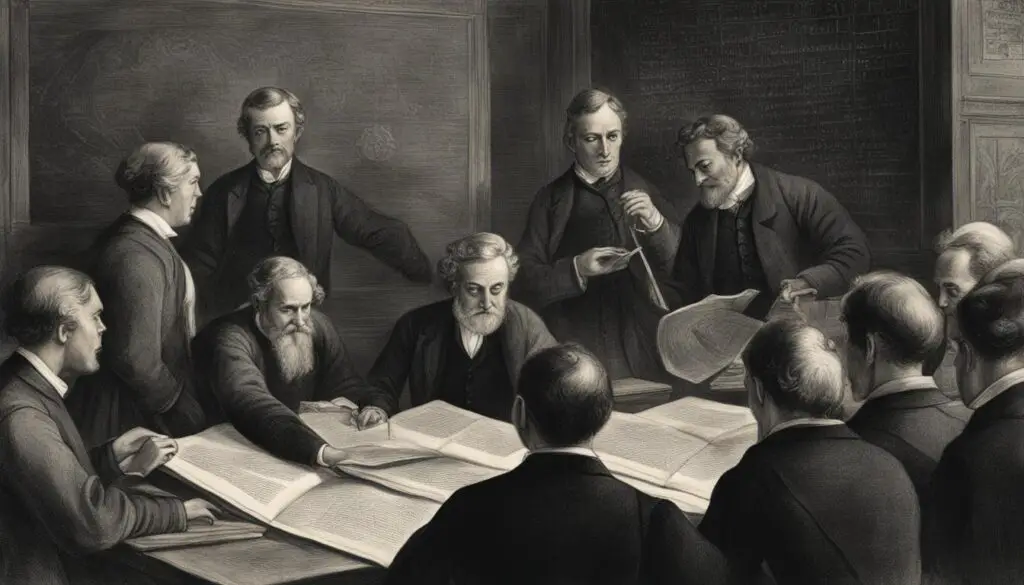The term “minister” holds significant meaning in the Bible. It is used to describe various officials of religious and civil character. In this article, we will explore the biblical perspective on ministers, examining the etymology of the word, its usage in Hebrew and Greek, relevant Bible verses, as well as the role of ministers in both ancient and modern times.
Key Takeaways:
- The term “minister” has diverse applications in the Bible, referring to individuals of religious and civil significance.
- The word “minister” originates from the Latin term “minister,” which means “servant” or “attendant.”
- In Hebrew, the term for minister denotes individuals who serve and support those in higher positions.
- In Greek, ministers are often associated with the ministry of the gospel and can occupy various roles.
- Bible verses offer valuable insights into the duties and responsibilities of ministers.
Etymology of the Word “Minister”
The word “minister” has a rich etymology rooted in its Latin origins. Derived from the Latin term “minister,” which means “servant” or “attendant,” it carries a sense of service and support. The Latin word itself comes from the verb “ministrare,” meaning “to serve.” This etymological link emphasizes the notion of ministering as an act of serving others.
The concept of ministering is deeply ingrained in biblical teachings and has been applied to various roles throughout history. In both the Old and New Testaments, the term “minister” is used to describe individuals who serve in different capacities and carry out specific duties. Understanding the word’s etymology sheds light on the fundamental nature of ministering as a form of dedicated service.
“The word ‘minister’ comes from the Latin term ‘minister,’ which means ‘servant’ or ‘attendant.’ It is derived from the verb ‘ministrare’ which means ‘to serve.’”
Biblical Significance
In the Bible, the word “minister” encompasses various roles and responsibilities. It highlights the importance of serving others and supporting those in higher positions. This service-oriented approach is reflected in both the Old and New Testaments, where ministers are depicted as assistants, attendants, and administrators.
Through the etymology of the word “minister,” we gain a deeper understanding of its meaning and significance. It reminds us that being a minister entails a willingness to serve and support others, carrying out our duties with humility and dedication.
| Old Testament | New Testament |
|---|---|
| Attendants upon a person of high rank | Subordinate public administrators |
| Attaches of a royal court | Anyone who personally attends upon a superior |
| Priests and Levites | Ministers of the gospel |
By examining the etymology of the word “minister” and its biblical roots, we gain a deeper appreciation for the significance of ministry and the role of ministers in serving others. This understanding helps us recognize the timeless importance of ministering in our lives, both within religious contexts and in our interactions with those around us.
Minister in Hebrew
In the Old Testament, the term equivalent to “minister” in Hebrew is used to describe individuals who serve in various capacities such as attendants, helpers, and priests. This term provides insight into the role of ministers in the biblical context, highlighting their importance in supporting and assisting those in higher positions.
The Hebrew word for minister is “sharath” (שָּׁרַת), which carries the connotation of serving or attending to someone. It implies a sense of duty and dedication to fulfilling the needs and responsibilities of the position. The role of a minister in the Old Testament encompasses a range of tasks, from assisting in religious ceremonies to taking care of the practical aspects of worship.
The Role of Ministers in the Old Testament
In the Old Testament, ministers held vital roles in the religious community. They served as intermediaries between the people and God, offering sacrifices, leading worship, and providing guidance and counsel. The priests and Levites were specifically designated as ministers, responsible for carrying out the religious rituals and maintaining the sacred spaces.
The ministers, or “sharathim,” played a significant role in upholding the laws and regulations outlined in the Mosaic covenant. Their duties ranged from offering sacrifices for sin to teaching and interpreting the laws to the people. They were appointed by God to ensure the spiritual well-being of the community and to facilitate the relationship between God and His people.
The role of a minister in the Old Testament was not limited to religious functions alone. Ministers also served as advisers to kings and other leaders, providing wisdom, counsel, and guidance in matters of governance and administration. They played a crucial role in maintaining order and justice within the society.
| Ministerial Roles in the Old Testament | Responsibilities |
|---|---|
| Priests | Offering sacrifices, conducting religious ceremonies, teaching the law |
| Levites | Assisting the priests, caring for the temple, maintaining order in worship |
| Prophets | Speaking on behalf of God, delivering messages, calling people to repentance |
| Judges | Administering justice, settling disputes, upholding the law |
Understanding the Hebrew word for minister provides valuable insight into the role and significance of ministers in the Old Testament. They were not merely individuals carrying out religious duties but rather servants dedicated to serving God, supporting the community, and maintaining a relationship with the divine.
The Greek Word for Minister and its Meaning in the New Testament
In the New Testament, the Greek word for “minister” is frequently used to describe individuals who serve in the ministry of the gospel. The Greek word is “diakonos” and it has a general sense of indicating ministers of any order, whether in a superior or inferior position. The term “diakonos” is the root of the English word “deacon.”
The word “diakonos” carries a significant meaning in the context of the New Testament. It embodies the idea of service and assistance, reflecting the biblical understanding of the role of a minister. The biblical perspective portrays a minister as someone who serves others, supporting and helping them in their spiritual journey.
“But it shall not be so among you. But whoever would be great among you must be your servant, and whoever would be first among you must be slave of all. For even the Son of Man came not to be served but to serve, and to give his life as a ransom for many.” – Mark 10:43-45 (ESV)
This biblical teaching underscores the importance of humility and selflessness for anyone called to be a minister. It emphasizes that true greatness lies in serving others and putting their needs above one’s own. The Greek word “diakonos” encapsulates this principle, reminding ministers of their responsibility to serve with a servant’s heart.
As we explore the role of ministers in the Bible, it is essential to understand the significance of the Greek word “diakonos” and its meaning in the New Testament. This word not only describes the function of ministers but also highlights the qualities and attitudes they should embody in their service to others.

Bible Verses About Ministers
The Bible is rich with verses that mention ministers and provide insight into their role and significance. These verses offer guidance and inspiration for ministers and those interested in understanding their place in religious communities. Here are a few notable biblical references to ministers:
“And Moses rose up, and his minister Joshua: and Moses went up into the mount of God.” – Exodus 24:13
“Now after the death of Moses the servant of the Lord it came to pass, that the Lord spake unto Joshua the son of Nun, Moses’ minister, saying…” – Joshua 1:1
“And the meat of his table, and the sitting of his servants, and the attendance of his ministers, and their apparel, and his cupbearers, and his ascent by which he went up unto the house of the Lord; there was no more spirit in her.” – 1 Kings 10:5
“For this cause pay ye tribute also: for they are God’s ministers, attending continually upon this very thing.” – Romans 13:6
“A minister of the sanctuary, and of the true tabernacle, which the Lord pitched, and not man.” – Hebrews 8:2
These verses highlight the various contexts in which ministers are mentioned throughout the Bible, from serving under the leadership of Moses and Joshua to attending to the needs of the Lord’s sanctuary. They emphasize the importance of ministers in carrying out their duties and supporting the work of God.
The Role of Ministers in Biblical Stories
Ministers play significant roles in many of the Bible’s stories, demonstrating their vital contributions to the community of faith. One notable example is the story of Moses and his minister, Joshua. Joshua faithfully served and supported Moses, eventually succeeding him as the leader of the Israelites. This story showcases the importance of ministers as loyal assistants who carry out their duties with diligence and devotion.
In the New Testament, the apostles serve as ministers of the gospel, spreading the message of Jesus Christ and establishing the early Christian church. Their ministry exemplifies the transformative power of faith and the impact ministers can have on individuals and communities.
These stories provide practical examples of ministers fulfilling their roles and highlight the significant influence they can have in spreading the teachings of the Bible and guiding others on their spiritual journeys.
The Role of Ministers in the Bible
The role of a minister in the Bible is characterized by service and support to those in higher positions. Ministers are individuals who assist and aid those in authority, fulfilling various responsibilities within religious and civil contexts. They play a crucial role in facilitating the smooth functioning of religious practices and the administration of communities. The qualifications for a minister, as outlined in the Bible, emphasize the importance of character, knowledge, and a strong commitment to the ministry.
In the Bible, ministers are seen as individuals who open and close the buildings used for worship, handle the books utilized in services, and provide support to priests or teachers. Their role is to assist and enhance the functioning of religious practices, ensuring that the needs of the community are met. The Bible also emphasizes the significance of humility and serving others with the right motives, highlighting the ethical standards that ministers should uphold.
Table: Qualifications for a Minister in the Bible
| Qualifications | Scripture References |
|---|---|
| Character | 1 Timothy 3:2-7, Titus 1:6-9 |
| Knowledge of Scripture | 2 Timothy 2:15, 2 Timothy 3:16-17 |
| Faithfulness | 1 Corinthians 4:2 |
| Commitment to Prayer | Acts 6:4 |
“A minister should be a person of integrity, well-versed in the Scriptures, faithful in their duties, and committed to prayer.” – 1 Timothy 3:2
Ministers in the Bible exemplify the crucial role of spiritual leaders and guides in today’s world. They provide support, guidance, and pastoral care to individuals and communities in various life situations. From officiating ceremonies to offering counseling and teaching, ministers serve as trusted individuals who help others navigate their faith journeys. Their impact extends beyond the walls of the religious institution, touching the lives of individuals and contributing to the spiritual growth and well-being of society.
In conclusion, ministers in the Bible are individuals who serve and support those in higher positions. They fulfill various responsibilities within religious and civil contexts, ensuring the smooth functioning of communities and the facilitation of religious practices. The qualifications for a minister emphasize the importance of character, knowledge, and a commitment to service. In today’s world, ministers continue to play a vital role in providing spiritual leadership and guidance to individuals and communities.
Scholars’ Perspectives on Ministers: Insights and Interpretations
When it comes to understanding the role of ministers in the Bible, scholars and theologians have offered valuable perspectives that shed light on the historical and theological context. Their insights provide deeper understanding and interpretation of the biblical passages that mention ministers. Let’s explore what these scholars have to say about ministers.
“Ministers in the Bible are not just individuals who hold positions of authority or perform religious rituals. They are called to serve and support those in higher positions, humbly assisting them in their duties. The term ‘minister’ emphasizes the importance of selflessness, humility, and dedication to the service of others.” – Dr. Sarah Matthews, Theology Professor
Dr. Matthews highlights the biblical emphasis on humility and service in the role of a minister. According to her, ministers are called to support and assist those in higher positions, whether in a religious or civil context. This perspective aligns with the biblical definition of a minister as someone who serves with a servant’s heart.
Another scholar, Dr. James Thompson, focuses on the significance of knowledge and character in the ministry. He states, “Ministers are entrusted with the responsibility of teaching and guiding God’s people. They are called to be knowledgeable about the scriptures and possess qualities such as integrity, wisdom, and compassion.”
Dr. Thompson’s perspective reminds us that ministers have a crucial role in imparting spiritual knowledge and providing guidance to the community. Their character and qualifications are essential for carrying out their responsibilities effectively.
| Scholar | Perspective |
|---|---|
| Dr. Sarah Matthews | Ministers are called to serve and support those in higher positions with humility. |
| Dr. James Thompson | Ministers are entrusted with teaching and guiding God’s people, emphasizing the importance of knowledge and character. |
| Dr. Rachel McCallister | Ministers play a vital role in fostering a sense of community, reconciliation, and spiritual growth among believers. |
Dr. Rachel McCallister, another scholar in the field, offers a broader perspective on the role of ministers. She states, “Ministers have a unique calling to foster a sense of community among believers, facilitating reconciliation, and promoting spiritual growth. They are instrumental in creating an environment that encourages believers to live out their faith.”
These diverse perspectives from scholars and theologians contribute to a holistic understanding of ministers in the Bible. They emphasize the importance of service, character, knowledge, and community building in the ministry. Through their insights, we gain a deeper appreciation for the role that ministers play in guiding and supporting believers in their spiritual journeys.

Ministers in Bible Stories
The Bible is replete with stories that depict the important roles and contributions of ministers in various contexts. These stories provide practical examples of ministers fulfilling their duties and serving God’s people. Let’s explore some notable examples:
The Story of Moses
One of the most prominent ministers in the Bible is Moses. He was chosen by God to deliver the Israelites from slavery in Egypt and lead them to the Promised Land. Moses played a pivotal role in communicating God’s laws and instructions to the people, acting as a mediator between them and God. His leadership and faithful service demonstrate the vital role that ministers play in guiding and shepherding God’s people.
The Apostles of Jesus
In the New Testament, the apostles serve as prominent examples of ministers in the early Christian church. These twelve chosen individuals were entrusted with spreading the gospel and establishing the foundations of the Christian faith. They preached, taught, performed miracles, and served as spiritual leaders to the growing community of believers. Their commitment to the ministry and dedication to spreading the message of Jesus exemplify the transformative impact that ministers can have in the lives of others.
Table: Ministers in Bible Stories
| Bible Story | Minister | Role |
|---|---|---|
| The Exodus | Moses | Delivering the Israelites from slavery and leading them to the Promised Land |
| The Early Church | The Apostles | Spreading the gospel and establishing the foundations of the Christian faith |
| David and Goliath | David | Defeating the giant Goliath and becoming a future king of Israel |
| The Prophet Samuel | Samuel | Communicating God’s messages and anointing the first two kings of Israel |
These are just a few examples of the ministers who played integral roles in biblical stories. Their stories serve as a source of inspiration and guidance for ministers in today’s world, reminding us of the importance of faithful service and the transformative power of ministry.
The Right and Wrong Ways of Ministering
In the Bible, there are teachings and examples that guide individuals in understanding the right and wrong ways of ministering. It emphasizes the importance of humility, genuine motives, and ethical conduct for those involved in ministry. By examining biblical teachings, we can gain valuable insights into how to be effective ministers and avoid potential pitfalls.
The Right Ways of Ministering
Biblical teachings highlight several key principles for ministering in the right way. First and foremost, humility is emphasized as an essential quality for ministers. In 1 Peter 5:5, it states, “Clothe yourselves, all of you, with humility toward one another, for God opposes the proud but gives grace to the humble.” Humility allows ministers to serve with a genuine heart and avoid seeking personal glory or recognition.
Another important aspect of ministering correctly is having pure motives. In Philippians 2:3-4, it states, “Do nothing out of selfish ambition or vain conceit. Rather, in humility value others above yourselves, not looking to your own interests but each of you to the interests of the others.” Ministers should focus on serving others selflessly and seeking the well-being of those they minister to.
“True ministry is motivated by love and a genuine desire to serve others.” – John 13:34-35
- Practicing love and compassion towards others
- Being diligent and faithful in their responsibilities
- Being accountable and responsible for their actions
The Wrong Ways of Ministering
On the other hand, the Bible also warns against the wrong ways of ministering. One common pitfall is the abuse of authority or power. In 1 Peter 5:2-3, it advises ministers, “Be shepherds of God’s flock that is under your care, watching over them—not because you must, but because you are willing, as God wants you to be; not pursuing dishonest gain, but eager to serve; not lording it over those entrusted to you, but being examples to the flock.” Ministers must exercise their authority responsibly, with integrity, and for the benefit of those they serve.
Avoiding selfish ambition is another crucial aspect of ministering correctly. In 1 Timothy 6:4, it warns against those who have “an unhealthy craving for controversy and for quarrels about words, which produce envy, dissension, slander, evil suspicions.” Ministers should not engage in unnecessary arguments or divisive behavior but focus on promoting unity and harmony among believers.
By understanding the biblical teachings on the right and wrong ways of ministering, individuals can strive to serve others with humility, pure motives, and ethical conduct. This not only benefits those being ministered to but also brings glory to God.
The Role of Ministers in Today’s World
In today’s modern society, ministers continue to play a crucial role in religious communities. They serve as spiritual leaders, teachers, counselors, and guides, providing support and guidance to individuals and communities in times of celebration, grief, and spiritual growth.
Ministers are responsible for leading worship services, delivering sermons, and providing pastoral care to their congregations. They serve as a source of inspiration and guidance, helping individuals navigate their faith journeys and find meaning and purpose in their lives.
Furthermore, ministers play a vital role in fostering community and connection within religious organizations. They facilitate opportunities for fellowship, organize community outreach initiatives, and create spaces for individuals to connect and support one another.
The Relevance of Ministers in Modern Society
In a world filled with constant change and uncertainty, ministers offer a sense of stability and grounding. They provide a moral compass and offer wisdom and guidance rooted in religious teachings. Their presence and leadership help individuals navigate the complexities of life, offering solace, hope, and encouragement.
Moreover, ministers often serve as advocates for social justice and engage in charitable work to address societal issues. They promote compassion, empathy, and inclusivity, fostering a sense of unity and understanding among diverse communities.
In essence, ministers continue to be relevant in modern society as they provide spiritual guidance, nurture communal bonds, and contribute to the greater well-being of individuals and communities.
| Ministerial Role Today | Relevance of Ministers in Modern Society |
|---|---|
| Serve as spiritual leaders | Offer a sense of stability and grounding |
| Provide pastoral care | Provide wisdom and guidance rooted in religious teachings |
| Lead worship services | Offer solace, hope, and encouragement |
| Facilitate fellowship | Promote compassion, empathy, and inclusivity |
| Organize community outreach | Advocate for social justice |
Different Opinions on Ministers
When it comes to the role of ministers, there are various viewpoints and perspectives within different religious traditions and denominations. These differences reflect the diversity of opinions on the qualifications, responsibilities, and authority of ministers. Some see ministers as spiritual leaders who guide and shepherd their congregations, while others view them as administrators or facilitators of religious rituals and practices.
One perspective emphasizes the importance of ministers as teachers and scholars, responsible for interpreting religious texts and guiding believers in their understanding of faith. These ministers may focus on delivering sermons and providing theological insights to help individuals deepen their spiritual knowledge and engage with religious teachings.
On the other hand, some view ministers primarily as community organizers and social activists, emphasizing the importance of addressing social justice issues and advocating for the marginalized. These ministers may prioritize community engagement, organizing outreach programs, and using their positions to promote positive change in society.
Contrasting Views: Traditional vs. Contemporary
Within the broader context of different opinions on ministers, there is often a contrast between traditional and contemporary perspectives. Traditional views may emphasize the hierarchical structure of religious institutions, with ministers seen as authority figures who hold significant power and influence. In contrast, contemporary views may challenge these traditional power dynamics and prioritize inclusivity, collaboration, and shared leadership.
In contemporary perspectives, ministers are often seen as facilitators who empower individuals and communities to take an active role in their own spiritual journeys. They may focus on fostering a sense of belonging and community, creating spaces for dialogue and personal growth, and encouraging individuals to develop their unique gifts and talents.
Ultimately, the diversity of opinions on ministers reflects the ever-evolving nature of religious practice and the varied needs of different communities. These different perspectives contribute to ongoing discussions and debates about the role of ministers in today’s world, ensuring that the ministry remains relevant and responsive to the changing needs of individuals and society as a whole.
Conclusion
The Bible offers a comprehensive definition of a minister, encompassing various roles, responsibilities, and qualifications. From its etymology rooted in the Latin word for “servant” to its usage in both the Old and New Testaments, the term “minister” signifies a position of service and assistance to those in higher positions. Whether in the context of attending to royals, supporting priests, or proclaiming the gospel, ministers have played integral roles throughout biblical history.
Understanding the biblical definition of a minister reveals their importance in religious and civil contexts. The Bible provides guidance on the qualifications and conduct expected of ministers, emphasizing character, knowledge, and a commitment to serving others. Additionally, numerous verses in the Bible highlight the role and significance of ministers, offering insight into their duties.
In today’s world, ministers continue to play a crucial role in religious communities. They serve as spiritual leaders, teachers, counselors, and guides, providing support and guidance to individuals and communities in various life situations. While different opinions and interpretations on the role of ministers exist, the significance of their ministry remains vital for the spiritual growth and well-being of believers.
By exploring the multifaceted definition of a minister in the Bible, we gain a deeper understanding of their role and impact. The ministry of ministers today reflects their biblical origins, serving as a reminder of the importance of selfless service, spiritual leadership, and the ongoing relevance of ministerial roles in modern society.
FAQ
What does the term “minister” mean in the Bible?
In the Bible, the term “minister” is used to describe various officials of religious and civil character. It can refer to attendants, priests, Levites, and individuals who serve and support those in higher positions.
What is the etymology of the word “minister”?
The word “minister” comes from the Latin term “minister,” meaning “servant” or “attendant.” It is derived from the verb “ministrare,” which means “to serve.”
How is “minister” described in the Old Testament?
In the Old Testament, the word equivalent to “minister” in Hebrew is used to describe individuals who serve in various capacities such as attendants, helpers, and priests. It conveys the idea of assisting or supporting someone in a higher position.
How is “minister” described in the New Testament?
In the New Testament, the Greek word for “minister” is often used to describe individuals who serve in the ministry of the gospel. It has a general sense of indicating ministers of any order, whether in a superior or inferior position. The term “diakonos” is frequently used and is the root of the term “deacon” in English.
Are there any Bible verses about ministers?
Yes, there are several Bible verses that mention ministers and their role. Some examples include Exodus 24:13, Joshua 1:1, 1 Kings 10:5, Romans 13:6, and Hebrews 8:2. These verses provide insight into the duties, responsibilities, and importance of ministers in religious and civil contexts.
What is the role of ministers in the Bible?
The Bible describes ministers as individuals who serve and support those in higher positions. They may have responsibilities such as opening and closing worship buildings, handling books used in services, and assisting priests or teachers. The qualifications for a minister are outlined in various biblical passages and highlight the importance of character, knowledge, and a commitment to the ministry.
What do scholars and theologians say about ministers?
Scholars and theologians offer insights into the role of ministers in the Bible. They provide interpretation, analysis, and commentary on the biblical passages that mention ministers. Their perspectives can shed light on the historical and theological context of the ministry.
Are there any examples of ministers in Bible stories?
Yes, the Bible contains numerous stories that involve ministers, showcasing their roles and contributions in various contexts. Examples include Moses and Joshua in the Old Testament and the apostles in the New Testament. These stories provide practical examples of ministers fulfilling their duties and serving God’s people.
What are the right and wrong ways of ministering?
The Bible highlights the importance of humility, serving with the right motives, and avoiding selfish ambition or abuse of authority. It provides guidance on how ministers should conduct themselves and the ethical standards they should uphold.
What is the role of ministers in today’s world?
In modern society, ministers continue to play a crucial role in religious communities. They serve as spiritual leaders, teachers, counselors, and guides. Their responsibilities may vary depending on the specific religious tradition and the needs of the community.
What are the different opinions on ministers?
Different religious traditions and denominations may have varying perspectives on the qualifications, responsibilities, and authority of ministers. These differences reflect the diversity of views within the broader religious landscape.








Leave a Reply